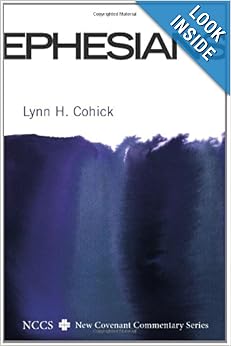Commentaries on never the first resource for those studying biblical texts but they do add some great substance to any indepth research. Recently, I did some research on Ephesians 1 and wanted to pass along some a recommendation regarding commentaries on the Epistle.

1. Cohick, Lynn H. Ephesians, Cascade Books: Eugene, OR. 2010
This commentary by Lynn Cohick, Associate Professor of New Testament at Wheaton College is from the NCCS series (New Covenant Commentary Series) put out by Cascade Books, an imprint of Wipf & Stock. The volumes in this series are relatively slim by commentary standards but seek to stick to the flow of argument that the NT authors make in their writings. A couple things worth mentioning concerning this commentary by Cohick; one, she is very good at combining exegetical rigor with a sense of the practical power of a text to believers. For example, on Ephesians 1:11-14 she writes,

1. Cohick, Lynn H. Ephesians, Cascade Books: Eugene, OR. 2010
This commentary by Lynn Cohick, Associate Professor of New Testament at Wheaton College is from the NCCS series (New Covenant Commentary Series) put out by Cascade Books, an imprint of Wipf & Stock. The volumes in this series are relatively slim by commentary standards but seek to stick to the flow of argument that the NT authors make in their writings. A couple things worth mentioning concerning this commentary by Cohick; one, she is very good at combining exegetical rigor with a sense of the practical power of a text to believers. For example, on Ephesians 1:11-14 she writes,
"Paul underscores the aspect of God's predestined plan to counter any hints that the appointment by lot was arbitrary from God's perspective . However, the verb is useful in its association with casting lots inasmuch as this reflects Paul's insistence that humans cannot win through merit God's gracious salvation." (53)
Secondly, the commentary provides brief excursus into issues with great importance such as election, predestination, and free will (see pg. 53-54). Cohick provides a balanced view that takes into consideration the renewed earth in light of discussions regarding predestination and free will. Rather than focusing unduly on the theoretical implications of these doctrines in Ephesians 1, Cohick tries to see how a robust view of God's salvation incorporates them into the lives of Christians.
Look for fuller commentary reviews on the NCCS series in subsequent weeks on this blog.
Comments
Post a Comment